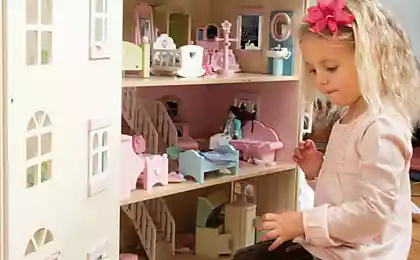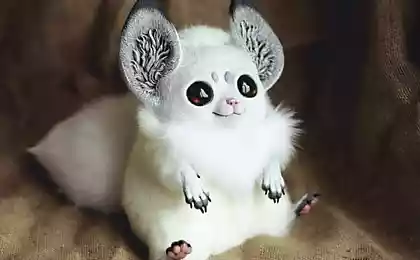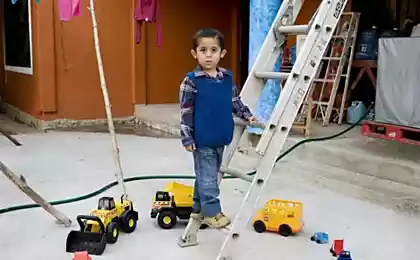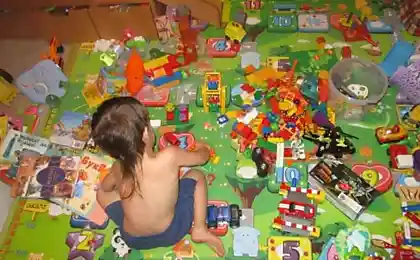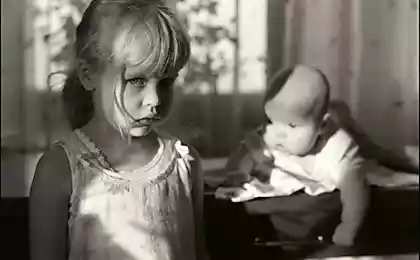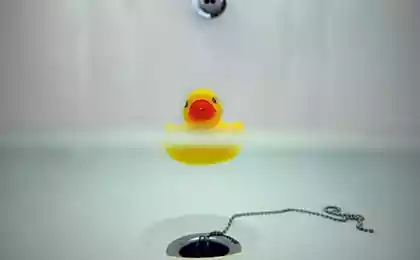635
The more the house of toys, the unhappier it becomes children

© CERISE DOUCÈDE
Breaking from children's toys, soft, wooden, educational, buzzing, squeaking, singing, table, and the child — zero attention to all this wealth. Parents promise to buy a new one, but once in the store, then give up under the onslaught of a pair of pleading eyes. And then wonder on the forums on the Internet: "Why is my child likes to play with toys, I may not choose those gifts..."
I myself, choosing a gift for his younger son's first birthday, faced with an almost insoluble problem — what to give? I tried to control, though not always successfully, toy boom close and distant relatives, making them the lists of desired purchases. Anyway, the apartment turned into a warehouse of toys, and a Junior from the cradle have played not only in rattles and musical pots, but with cars, LEGO and guns. At the time, I came across a box of the usual wooden cubes, bought them almost out of desperation. The dice became a hit last year in our family, first the older and then younger and Mature enough to play the dice-men and toy blocks-letters.
"How often does your child have a new toy? — refers to the accomplice at the children's forum and a young mother. — My husband and I have a thing in this matter, not enough of something, in childhood. Buy like two fools, so much, that these dolls and the designers of the house soon we will be evicted. In my childhood I had almost all the toys that were at the time, to get, to defend kilometer queue. Now when I see something new on the shelves, pay the last money. From this solid hole in the budget, I'm sad, but go out and buy again and again..."
Some call it self-indulgence. Other regret, buying all the toys in a row, depriving their children of the opportunity to dream. Why dream about the car or the doll, behave, eagerly counting the days until the New year or birthday because the best gifts are only on major holidays. And then the parents wonder why the kid played 5 minutes with a new toy and threw it away. He was again bored, and parents rushed on in a whirlwind of daily worries. Why children love to play with soup ladles, pots and pans, a vacuum cleaner and your dad's tools, perhaps because these "games" you can play with their parents. No the most expensive and fashionable toys will not replace the child's communication with parents.
Expert opinion
Egorova Tatiana, a teacher-psychologist of GUZ "Centre of pediatric Psychoneurology":
— What heartrending scenes you can see at the counters when an exhausted mom trying to get her roaring child from expensive dolls or cars! Many parents, denying your son or daughter once you purchase a tenth of the cars even feel guilty in front of the child: "I was a bad parent, if not buy, at his request,"...
In fact the child is even contraindicated to have in your children's corner, a mountain of toys. Highly distracting, it is difficult to focus on a particular game, he quickly loses interest in the toy, demanding a new one. Parents believe that their child is developing rapidly, so it is boring to play with yesterday's toys, but in reality, he had formed casual gaming activities. No understanding of particular social roles, weak storyline in the game, decelerated overall mental development. The basic problems arise with self-cleaning.
For active play to a child is enough to have from five to ten toys that he can play a variety of games. It is possible to recommend to parents to remove the excess in a bag and once a week to do "inventory" available in the area of children's toys, replacing one by the other and keeping the effect of novelty.
There are certain criteria for the selection of toys according to age of child and level of development. The best toy is the one that aims at the development of sensory and motor systems involves imagination, thinking, memory and perception. This toy should be as simple, made of quality material. So, babies (0 to 12 months) interesting rattles, pendants, mobiles, rustling balls — these toys develop visual, auditory, and cutaneous-tactile analyzers, coordination of movements. Young children (1 to 3 years) pyramids, cubes, cars, dolls are toys, which you can use to organize activities. First comes the manipulation of objects matching in shape, color, size, and then basic steps characteristic of a particular social role (sickness doll, unloading truck, etc.). When selecting toys it is very important to pay attention to its aesthetics and lack of antisocial and aggressive traits. The simpler the toy, the better it is for the child. For example, a simple doll is preferable to one that has a ready set of actions (says a standard phrase, writes in a pot, requires food, walks), as in the latter case, the initiative of imagination and thinking is suppressed by the mechanism of a toy.
For older children there are the designers, jigsaw puzzles, collective educational games where you can play with your family or with friends. Such games broaden the mental horizons of the child, teach the ability to negotiate, to resolve arising issues.
The most dangerous children's toys
Darts. Playing Darts is possible only under the supervision of parents. Annually 7 thousand children hospitalitynet with injuries sustained in the process of throwing Darts.
Toys made of foam rubber and a soft foam plastic. To take a bite from this toy will not be difficult, and the consequences can be unpredictable.
Baby toys that make loud noises. Sound over 65 decibels emanating from the ear can cause irreparable damage to children's hearing system.
Toys with magnetic parts. Two or more magnets, attracted to each other in the gastrointestinal tract, cause a lot of trouble surgeons.
Short kaleidoscope. If the length of the kaleidoscope is less than 25 cm, it leads to blurred vision in children.
Guns, shooting small hard pellets. These bullets are becoming a source of injury to the eyes and soft tissues. Kids love to poke their nose and ears.
Flavored toys. Can cause serious allergic reactions.
Toys with bright, unnatural colors. For their use in coloring lead and cadmium.
Children's cosmetics. If there is no certificate, the composition frequently exceeded the content of chromium, cadmium, lead and arsenic.
Silver and gold plated toys. Dyes contain lead and antimony in excess quantity.
Author: Natalia Lebedeva
Source: www.ecology.md/section.php?section=fsociety&id=13328#.VJR0KMAgk


